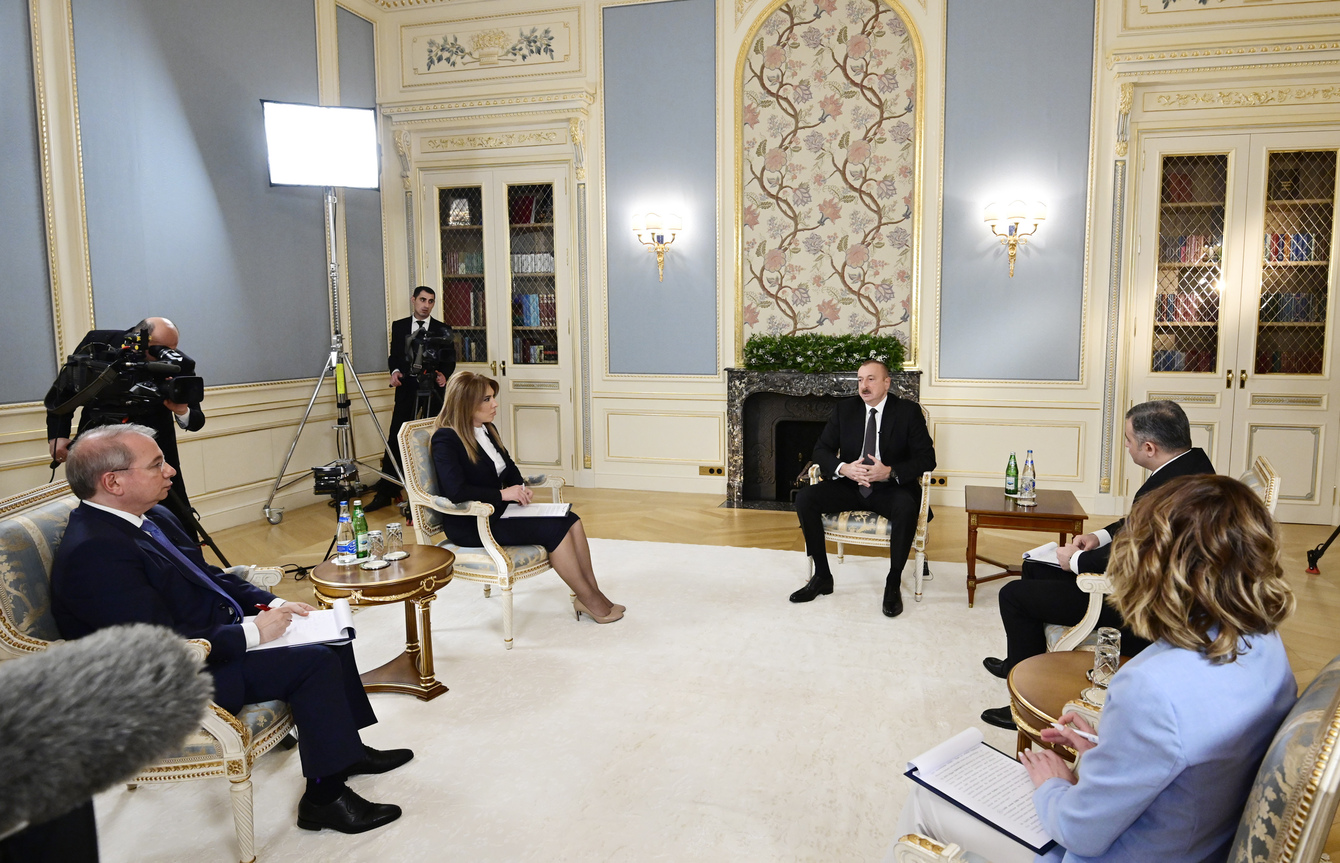In an interview with journalists on Monday, Azerbaijan’s President Ilham Aliyev addressed issues that made headlines throughout the year, including energy and transportation projects currently underway, Baku’s relationship with Europe, and the government’s role in promoting multiculturalism. Aliyev’s comments on the Nagorno-Karabakh conflict between Azerbaijan and Armenia were sobering.
“I can say that 2019 was a lost year for the negotiation process,” he said, according to the president’s official website. “The only reason for this is that the Armenian leadership takes a non-constructive position in these negotiations, and international mediators do not exert the necessary influence and pressure on the aggressor country. That's why in 2019, I can say that no progress has been made in the negotiation process.”
President Aliyev noted contradictory statements made by Armenia’s Prime Minister Nikol Pashinyan in 2019, including describing Azerbaijan's Nagorno-Karabakh region as an “independent state” and calling on Azerbaijani officials to hold talks with those heading self-styled and unrecognized illegal regime in the occupied region. Later on, however, the prime minister called the region a part of Armenia.
“Today, 90 percent of the military units located in Nagorno-Karabakh are made up of Armenian citizens. Large amounts of money are transferred annually from the Armenian budget to the Nagorno-Karabakh budget. Therefore, it is completely false to call it an independent state,” President Aliyev noted.
No country, including all UN member states, recognize Nagorno-Karabakh as being independent, as the region is internationally recognized as part of Azerbaijan.
In March, Pashinyan had proposed that the illegal separatist regime in Nagorno-Karabakh be a party to the negotiations. But doing so is considered unacceptable by the officials in Baku, who do not recognize the region as being independent from Azerbaijan. Pashinyan and Aliyev met four times this year – in January, March, May and October.
In August, Pashinyan went even further to enflame tensions with Baku, saying during a visit to the occupied region that "Karabakh is Armenia and that's it.” Azerbaijan's foreign ministry reacted by saying that Pashinyan was provoking tensions. Another contradictory statement was Pashinyan's words that Yerevan could not speak on behalf of residents in Nagorno-Karabakh because it is an “independent state.”
“The truth is that - as I said in a live broadcast - Karabakh is Azerbaijan and an exclamation mark,” President Aliyev said in his interview on Monday. “We have proved to the world that Nagorno-Karabakh is an eternal historical land of Azerbaijan. As a result of our policy, the world community today knows that Armenians are an outside nation in the South Caucasus, and they were relocated to our region by Tsarist Russia after the Russian-Iranian war in the 19th century.”
“After the Caucasus became a part of the Russian Empire, Armenians from Eastern Anatolia and Iran were massively relocated to Nagorno-Karabakh to increase the Christian population in our region. There are numerous historical documents and facts proving this. Therefore, it is our historical land and now the whole world knows it.”
The increase in the number of Armenians living in Nagorno-Karabakh eventually led to ethnic conflicts between the indigenous Azerbaijani population and the migrant Armenians, in particular.
In 1923, following the incorporation of Azerbaijan into the USSR, Azerbaijan's Nagorno-Karabakh region was given the status of an autonomous region within the borders of Azerbaijan by the Soviet government.
However, after the Soviet Union collapsed in December 1991, the region became a hotbed of conflict. Armenia launched a full-fledged attack against Azerbaijan, as a result of which Armenia occupied the Nagorno-Karabakh region and the seven surrounding districts – in total, comprising 20 percent of Azerbaijan’s territory. Roughly 30,000 residents were killed and one million others were displaced during a bloody war that lasted until a ceasefire deal in 1994.
“Nagorno-Karabakh is an integral part of Azerbaijan, and when we joined the United Nations as an independent country, the territorial integrity of Azerbaijan has been accepted, supported, and approved,” President Aliyev said in the interview on Monday. “Our principal position is that the principle of territorial integrity should prevail, our territory must be restored, and the conflict should be solved only on the basis of these principles.”







 Russian peacekeeping forces, deployed in the Karabakh (Garabagh) region of Azerbaijan since 2020, have commenced their withdrawal from the area.
Russian peacekeeping forces, deployed in the Karabakh (Garabagh) region of Azerbaijan since 2020, have commenced their withdrawal from the area.
 Iran’s Foreign Minister, Hossein Amir-Abdollahian, has labeled a foiled Israeli drone attack in certain parts of the country as a "failure" for Isr...
Iran’s Foreign Minister, Hossein Amir-Abdollahian, has labeled a foiled Israeli drone attack in certain parts of the country as a "failure" for Isr...
 Iran has refuted reports of alleged damage to Shimon Peres Negev Nuclear Research Centre located southeast of Dimona, Israel, during the recent air...
Iran has refuted reports of alleged damage to Shimon Peres Negev Nuclear Research Centre located southeast of Dimona, Israel, during the recent air...



